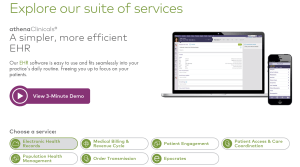Athenahealth: Taking on the Giants and Disrupting the Health Care Space
Disrupting heath care via cloud-based provider services
Introduction
Athenahealth is a cloud-based service company with the goal of delivering better health care. Athenahealth provides a suite of services to help medical providers manage care, process billing, and communicate with patients in ambulatory care and outpatient settings.
Athenahealth has been hugely successful; the company went public in 2007 and recently posted $5.8 million in income and year-over-year revenue growth of 24%. Athenahealth has capitalized on a growing global health care IT market which is expected to grow 64% over the next five years and health care cloud computing which is expected to triple by 2018.

Business Model
Athenahealth delivers value to providers by streamlining administrative tasks, helping them get paid, and providing them visibility into the broader continuum of care. Some of their biggest services are cloud based Electronic Health Records (HER), and medical billing and patient engagement service. Athenahealth’s business model is that they only get paid based on results. The pricing model is structured such that Athenahealth gets paid based on what it achieves for its client, such as getting claims paid, submission of pharmacy orders, or receipt lab results.
Providers have traditionally used costly health record software requiring a significant time and training investment. Athenahealth’s competitive advantage is that the cloud based software allows for quick installation, remote technology updates, little-to-no server outages, and a pay for performance model.
Athenahealth’s More Disruption Please (MDP) programfosters the growth of high potential, early-state startups. MDP sources startup partners for Athena’s online marketplace, which is equivalent to an App Store on AthenaNet for Athenahealth’s 72,000 health care providers. Athenahealth gets 20% of each marketplace sale; in 2014, Athenahealth gained $5 million in MDP partner transactions, and they expect the amount to grow to $100 million in five years. Athenahealth also recently launched an accelerator program, whereby MDP provides funding for startups. Funded startups are given office space at the Athenahealth campus for a year while building out their ideas – helping infuse the campus with a constant stream creative and entrepreneurial energy. In addition, Athenahealth frequently organizes disrupting medicine hackathons to source new ideas and promote their products and services.
Operating Model
The company’s operating model is aligned with, and supports, the business model. The company’s culture emphasizes disruption and innovation as key tenants of the organization. The CEO, Jonathan Bush, an HBS graduate, is a quirky and outspoken critic of the current healthcare system. He believes Athenahealth can lead the charge to disrupt the current system and build the healthcare internet.
Athenahealth headquarters is a physical embodiment of these values. The campus is set in Watertown, Massachusetts and features a Frisbee golf course, a beer garden, open spaces, shuttles to Cambridge and Boston, and an organic cafeteria. Employees get perks such as a casual dress code and discounted gym memberships. The office space also supports the organization’s operating model of a flat organization, with intense collaboration, constructive debate, and transparency, as all offices and meeting spaces are open or have glass walls. The company also frequently undergoes reorganizations to discourage complacency and spur innovation.
Athena health is a mission driven organization and hires people based on fit. The company’s internal and external messaging is consistent with encouraging disruption and positioning Athenahealth as a solution that reduces the red tape, bureaucracy and administrative tasks facing providers today. The company recently began an advertising campaign entitled “Let Doctors Be Doctors.” The campaign speaks directly to providers and is designed to use humor to show how doctors and healthcare providers are unable to provide the best care for patients because they spend too much time on computers doing electronic health records.
https://www.youtube.com/watch?v=azzhBicHqds
Conclusions
Athenahealth is a winner with a self-reinforcing business model and operating model. Their mantra of innovation and disruption encourages creative thinking and collaboration and constantly inspires new services, frequent acquisitions, and programs such as MDP. Similarly, their mission oriented and results-driven orientation allow them to analyze large amounts of data and charge based on the value they deliver to providers.
Looking Ahead
Athenahealth faces intense challenges as it continues to scale. Conventional software companies are deeply entrenched because hospitals have spent billions of dollars installing and learning this technology and are reticent to replace it with unproven systems. However, Athenahealth recently acquired RazorInishgts, a leader in cloud-based electronic health care and financial solutions for rural, critical access, and community hospitals, as a step to allow the company to enter the hospital market.
Sources
- “Interview with Geoff Maletta, Athenahealth: Delivering Value at Scale.” Business Today
- Athenahealth Press Realeases
- “How Athenahealth Became a Wall Street Debaste.” Business Insider
- “Health care will have its own Internet soon, Athenahealth chief says.” CNN Money
- “Athenahealth Doubles Down on Hospital Market.” Forbes
- “Is Athenahealth CEO Jonathan Bush in a Bubble?” Fortune





Really interesting organization. What’s really impressive about Athenahealth is how it’s sustained it’s high growth levels for so long. As they scale, do you know of any innovative hiring practices to make sure they get quality people (in Watertown, MA)? Also, have you seen anything around how their acquisition integrations are going? I’d imagine that is a big operating challenge.
Agree with the comment above–Athenahealth is an interesting company with a great growth story. I’m also curious:
1. How they improve coordination across multiple specialties given inherent differences and disparate IT systems? How has their operating model supported this?
2. What role are they (or will they) play in the current direction of payment reform? Are they looking to build out more capabilities to support physicians and they move towards value-based medicine? If so, are they participating in any of the existing CMS pilots and are their any significant shifts in their operating model to support these new changes?
Completely agree with the comments above – Athenahealth is definitely disrupting the EMR environment with its cloud-based solutions. As I think about their future, I can’t help but wonder:
1. Do you think that they will be able to continue growing at such a fast pace? If so, how do you think this growth will impact their operating model or internal organizational structure?
2. A known issue within hospitals and even across hospitals and payers is the inability to easily share data. As they begin to think about hospital solutions, are they considering how to connect the various disparate devices within the hospital to their cloud-based solutions?
3. How does their More Disruption Please program complement their core business model. Does it currently bring any added value to their client relationships?